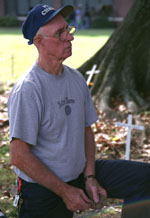More than 40 students and faculty members will join 10,000 to 20,000 others in Columbus, Ga. this weekend to protest the School of the Americas.
This year’s demonstration marks the 15th anniversary of the slaying of six Jesuits, their housekeeper and her daughter at the University of Central America in San Salvador, El Salvador. The men responsible for the murders were graduates of the SOA.
The school has come under great criticism as being a training facility for terrorists, murderers and dictators, although it was created to train Latin American militaries. Its military training facility is located at Fort Benning Army Base in Columbus. Although it is still known as the SOA, Congress renamed the organization the Western Hemisphere Institute for Security Cooperation, or WHINSEC.
According to the Rev. Eddie Gros, S.J., the most egregious offenders of human rights in Latin America over the past few decades have been graduates of the SOA. Gros has worked as a missionary in Latin America for several years, and said that some of his own parishioners had been tortured by SOA-trained soldiers.
“It’s a wartime paradigm,” Gros said. “They are teaching soldiers to go back to their country and target their own countrymen.”
According to SOA Watch, an independent organization seeking the closure of the school, graduates of SOA include many Latin American dictators, such as Manuel Noriega of Panama and Hugo Banzer Suarez of Bolivia. Those responsible for the assassination of Archbishop Oscar Romero in San Salvador and the El Mozote Massacre of 900 civilians, including many woman and children, were also graduates of SOA.
Bill Quigley, professor of law and head of the Loyola School of Law’s law clinic, has attended the protests for five years and has been an attorney for the SOA Watch group for about four years.
He recently won a case with the group in the 11th Circuit Court of Appeals that will prohibit local law enforcement from forcing protestors to pass through metal detectors prior to the protest. Quigley also offers free legal council to those arrested during the protest.
“[The SOA] has made some modest reforms,” he said, “but needs fundamental change. It needs to be closed, investigated, and evaluated by a congressional committee … then, if it does fit a positive role, re-opened in a different scenario,” Quigley said.
Kerry Deichmann, criminal justice senior, has been attending the protest for the past five years and has witnessed the results of the SOA firsthand.
“They don’t give adequate amounts of human rights training. [The graduates] just follow orders. They have no consideration for human life,” she said.
Deichmann spent the past two summers in El Salvador teaching English to prisoners and working with former gang members, and spent time in high school working in rural villages mostly comprised of refugees.
“A lot of people know it is a long road to close the school,” Gros said. “If we really wanted to help Latin America, we could definitely export something other than this.”
Gros said that, in addition to the protests, there is the Ignatian Family Teach-In, which will take place in a large tent near the base on Saturday. The teach-in will feature presentations on social justice, Ignatian spirituality, how to make the world more peaceful, as well as a large mass that evening.
“It is more than just a protest,” Gros said. “You connect with people across the country who are connected and passionate about peace.”
Three to four thousand people will attend the seminar, including representatives from all 28 Jesuit universities around the nation, Gros said
“It is a unique experience,” Quigley said of the weekend’s events, citing the seminars and music, as well as the solemn remembrance of victims and the call for the school’s closure.
The trip to Fort Benning marks the end of Martyr’s Week at Loyola, sponsored by Students Seeking Solidarity. During the week, masses, a luncheon, a movie screening and a lecture Tuesday evening from Carlos Mauricio, a survivor of the torture and violence of SOA graduates, were given.
The SSS also blanketed much of Loyola’s campus with crosses, each with the name of a different innocent campesino, or peasant, killed in the struggle for justice in Latin America.
“Closing the school is the first step,” Deichmann said. “The second step is to hold people accountable for all their atrocities throughout Latin America.”
Adam Hennessey can be reached at [email protected].







